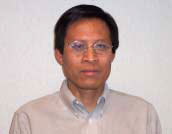 |
Task Leaders: Michael Wang

Michael Wang
Center for Transportation Research
Argonne National Laboratory
ESD-362/G216
Argonne, IL 60439
(630) 252-2819
mqwang@anl.gov
http://greet.anl.gov
Dr. Michael Wang has a Ph.D. degree in environmental studies from the University of California at Davis. He is an environmental analyst in Center for Transportation Research at Argonne National Laboratory specializing on energy and environmental impacts of motor vehicle technologies and transportation fuels.
Dr. Wang has been working in the area of evaluating emission and energy impacts of new transportation fuels and advanced vehicle technologies for over 16 years. He has developed the GREET (Greenhouse gases, Regulated Emissions, and Energy use in Transportation) model at Argonne National Laboratory. The model calculates energy use and emissions of various transportation fuels and vehicle technologies and is being used by governmental agencies, industries, and public interest groups. He has conducted studies to evaluate energy and emission effects of vehicle/fuel systems for U.S. Department of Energy, state of Illinois, the General Motor Corporation, and the U.S. Environmental Protection Agency.
Dr. Wang is the chairman of the International Subcommittee on Transportation Energy and Alternative Transportation Fuels of the Transportation Research Board. He is a director of the Board of the Energy Foundation. Dr. Wang is a member of the Energy Conservation Committee of the Transportation Research Board, National Research Council. He is a member of the Society of Automotive Engineer, the Air and Waste Management Association, and North American Chinese Overseas Transportation Association. Dr. Wang has served on technical advisory committees for several major international studies on advanced vehicle technologies and transportation fuels conducted by or for governmental agencies, automotive companies, and energy companies in North America, Europe, and China. He has also served on graduate student dissertation committees.
During his professional career, Dr. Wang has produced more than 110 publications and gave invited presentations in more than 30 professional conferences.